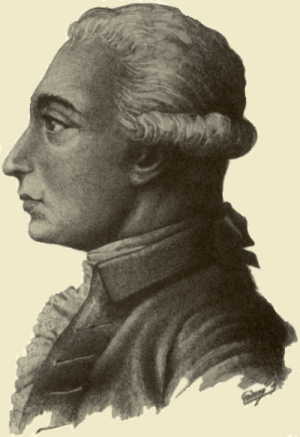Louis Claude de Saint-Martin facts for kids
Quick facts for kids
Louis Claude de Saint-Martin
|
|
|---|---|
 |
|
| Born | 18 January 1743 Amboise, France
|
| Died | 14 October 1803 (aged 60) Aulnay, France
|
| Occupation | Philosopher |
Louis Claude de Saint-Martin (born January 18, 1743 – died October 14, 1803) was a French thinker. He was known as le philosophe inconnu, which means "the unknown philosopher." This was the name he used when his books were published.
Saint-Martin was a very important person in the world of mysticism. Mysticism is about finding a deeper, spiritual understanding of life. He also thought a lot about how the human mind develops. His ideas later inspired the creation of the Martinist Order, a group focused on spiritual growth.
About His Life
Louis Claude de Saint-Martin was born in Amboise, France. His family was part of the lesser nobility, which meant they had some status but were not super rich or powerful.
His father wanted him to have a good job. So, Louis Claude first tried studying law. After that, he joined the army. While he was stationed in Bordeaux, he met a man named Martinez de Pasqually. This meeting changed his life. Pasqually taught a special kind of mysticism. It was based on old spiritual traditions. Saint-Martin worked as Pasqually's secretary for a few years.
In 1771, Saint-Martin decided to leave the army. He wanted to focus on sharing his spiritual ideas. He became a kind of preacher for mysticism. He lived in Lyon for a while and wrote his first book there.
Saint-Martin was good at talking to people. He was often invited to important social gatherings in Paris. He traveled a lot to share his ideas. He visited England, Italy, and Switzerland. In England, he met William Law, another famous mystic. In 1788, he met Charlotte de Boecklin in Strasbourg. She introduced him to the writings of Jakob Böhme, a German mystic.
During the French Revolution, Saint-Martin faced difficulties. Because he was a nobleman, he was held for a time. His property was taken away. However, local officials later released him. They even wanted him to become a school teacher.
Saint-Martin was raised as a strict Catholic. He always stayed connected to the Church. But his first book, Of Errors and Truth, was put on the Index. This was a list of books that the Catholic Church did not want people to read. He passed away in Aulnay (now Châtenay-Malabry) in 1803.
His Writings and Ideas
Louis Claude de Saint-Martin was the first person to translate the works of Jakob Böhme from German into French. He spent many of his later years writing his own main books. He also continued translating Böhme's works.
His most important books include Lettre à un ami (Letter to a Friend). This book shared his thoughts on the French Revolution. He also wrote L'Esprit des choses (The Spirit of Things). This book looked at the nature of beings and why they exist.
Saint-Martin believed the French Revolution was like a big lesson. He saw it as a spiritual event. He imagined an ideal society where God would guide people. He thought God would raise up special people to lead. These leaders would see themselves as God's helpers.
He believed that traditional church groups would disappear. Instead, there would be a pure, spiritual form of Christianity. This would be based on a special feeling or sense. This sense would be stronger than just reason. It would help people understand God.
Saint-Martin thought God is an eternal being. He believed that creation was an overflow of God's love. God's love was so great it couldn't be contained. He saw the human soul, the human mind, the spirit of the universe, and matter as different stages of this divine outpouring. He believed humans were a direct reflection of God. And nature, in turn, was a reflection of humans.
However, he thought humans had fallen from their perfect state. He believed that matter itself was a result of this fall. But he also believed that God's love, connected to humanity through Christ, would eventually fix everything. It would bring about a final renewal of the world.
His Impact
People who admired Saint-Martin's writings formed groups. They called themselves Friends of St. Martin. These groups later became known as Martinists. They continued to explore and share his spiritual ideas.
See also
 In Spanish: Louis Claude de Saint-Martin para niños
In Spanish: Louis Claude de Saint-Martin para niños
 | Selma Burke |
 | Pauline Powell Burns |
 | Frederick J. Brown |
 | Robert Blackburn |

